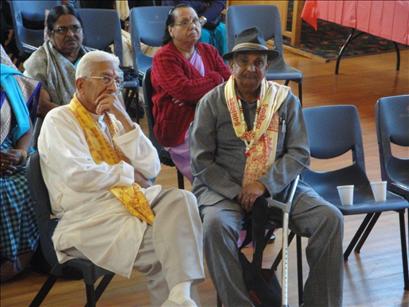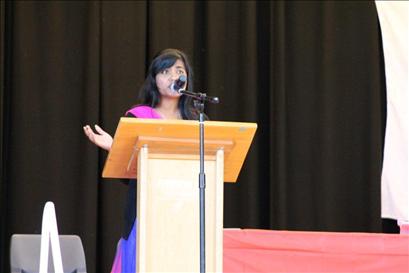
 “Women were forced to work on farms just days after birth. They had to leave their crying babies at the fringes of farms and were not allowed to feed them.
“Women were forced to work on farms just days after birth. They had to leave their crying babies at the fringes of farms and were not allowed to feed them.
“Most suicides were by hanging, committed in early mornings. When the feet touched the ground because the rope was too long, the victims folded their feet- so great was the desire to die and escape from a barbarous and inhumane system of Girmit.”
That was the stolen history of Girmit, the indenture system told by Rajendra Prasad, author of Tears in Paradise (Suffering and Struggles of Indians in Fiji 1879-2004).
Editor’s Note: Indian Newslink was involved with the launch of the Book in Auckland on August 21, 2004 and has since then published excerpts in a number of issues.
Many people attending the first ‘Girmit Remembrance Day’ organised by the Senior Citizens Group of the Waitakere Indian Association (WIA) in Mt Albert (Auckland) on May 20, 2012 could not control their emotions.
Speaking at the event, Mr Prasad, a third generation Indo-Fijian, said that on May 14, 1879, the first ship Leonidas anchored at the Levuka Harbour in Fiji with 479 Indian indentured labourers on board. Several ships followed and in all, 60,553 Indian labourers were taken to Fiji as indentured labourers. Most of them were employed by the CSR Company on its large sugarcane plantations.
Excessive abuse
The Girmitiyas served their indenture under horrific conditions, resulting in the highest rate of suicide in the world during that period. The victims suffered physical and mental violence. Fear and apprehension saturated their lives and they could not resist the evil system.
“Our community paid a heavy price and was systematically robbed of billions of dollars. Legally, there is no recourse to seeking justice but that does not absolve the British from its moral obligation to accept its iniquities and to express its remorse,” he said.

Former Radio Fiji Deputy General Manager Devakar Prasad, who headed the 100th Anniversary Girmit Remembrance in Fiji in 1979, visited India to research and put together a 45-minute musical-hist
He gave a synopsis of his recording and said that Girmit Remembrance does not always have to be an occasion to cry, but to celebrate the sacrifices, perseverance and foresight of our ancestors. They were adaptable people who shed off old hang-ups and started afresh with a distinct ‘Indo Fijian Culture.’orical presentation.
Sad Reflections
Subhag Wati rendered the old ‘sohar’ (traditional wedding song) to the rhythmic accompaniment of claps by the audience, while Lal Bahadur took us to the ‘coolie’ lines of the Girmit era with ‘birah’.
Pundit Sharda Nand Maharaj, Narain Prasad and Kapil Deo Singh spoke about the horrid days of Girmit, showing newspaper clips and evidence of old records.
Niyaz Begum Shariff, sister of Fiji parliamentarian and community leader, Chirag Ali Shah narrated her family history.
It was also an occasion for the younger generation to express their sentiments.
A speech written by Waitakere Hindi School student Praval Tahal and delivered by Auckland University student Hasmita Singh said that it was a day to not only reflect on the atrocities suffered by the Girmitiyas but also on their resilience and perseverance in moving towards a better future.
“We must also reflect on the positives that have come out of the Girmit System and not dwell overly on the negatives that are bygones.”
Resilient Girmityas
The message from new generation was that ‘Girmit Remembrance Day’ is an occasion for thanksgiving. For these fifth generation descendants of Girmityas, their ancestors were great adventurers, visionaries and pioneers. They were grateful that the ‘real heroes’ left their place of birth and sailed to a foreign land to seek a better life for themselves and their future generations, while preserving their religion, culture and language.
Girmit Remembrance Day was neither a fundraising event nor a Bollywood performance devoted to singing and dancing.
It was not a day for politicians and big shots. It was a day our elderly people were honoured.
New Trust
The meeting passed a resolution to observe May 14 every year as ‘Girmit Remembrance Day.’ The Meeting also agreed to form a trust or specialist group under the leadership of WIA to promote the knowledge and history of indenture.
Thakur Ranjit Singh is second generation descendent of Girmitiya Bansi from Karauli, Rajasthan, India. Bansi went to Fiji in 1915 as an indentured labourer, served five years and settled in Ba, where Thakur was born.
E-mail: thakurji@xtra.co.nz






